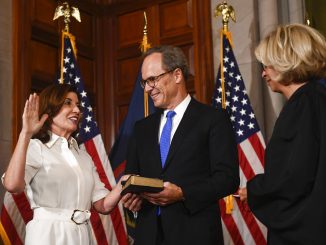

Aesop long ago told the story of the wolf and the dog.
The wolf is starving, thin as a rail, when he meets a well-fed, strong dog. When the dog learns the wolf is barely surviving, he invites him to come and live with him on the farm. “You’ll get plenty of food and treats of all kinds,” the dog says. “And all you have to do is bark at strangers and make a fuss over the farm’s owners and children. It’s an easy life.”
The wolf is salivating at this prospect when he notices the dog’s collar. “What’s that around your neck?”
“Oh, that,” the dog replies. “It’s nothing. It’s just used when they chain me up.”
“You have to wear a chain? You aren’t free to do what you want or go where you please?”
“Not all the time,” the dog says. “But who cares?”
“Thank you very much,” the wolf says, “but I’ll keep my freedom!”
And with that, he turns and runs off into the forest.
The Battlefield Today
Aesop’s fable serves as an excellent metaphor for the turmoil in today’s body politic. Some Americans want to preserve their traditional liberties and to live as much as possible without government interference in their affairs. Others, like Aesop’s dog, are willing to wear a collar if their masters care for them. This difference in values is at the core of today’s political battles.
That collectivism has gained favor among 21st-century Americans cannot be doubted. A 2019 Gallup poll, for example, shows an increase in those who have positive views of socialism, but reports as well that American views on socialism are “complex” and “nuanced and multifaceted.”
I suspect one reason those views are “complex” and “nuanced” stems from ignorance, particularly among our younger citizens. According to the group Victims of Communism, a third of millennials believe more people were killed under George Bush than under Joseph Stalin. Nearly half of the older members of Generation Z, those born in 1997 and later, report they would vote for a socialist, and 1 in 5 would vote for a communist. If true, we must assume these young people know absolutely nothing of the dark underbelly of collectivist movements of the past 100 years, the murders of millions of people around the world, the imprisonment of millions more, and the suppression of the most basic of freedoms.
But positive views of socialism or communism come not just from brainwashing or ignorance of collectivism’s history. These same young people are also ignorant about capitalism, the Constitution, and traditional American liberties.
Our Lost Love of Country
In his 1995 book “The End of Education”—the title is a double-bladed sword—Neil Postman examines a report assessing educational goals involving the New York Board of Regents. Included in the report were 41 goals aimed at “what children should be, know, and be able to do.” Postman then notes that one goal—“acquiring and/or deepening a love of one’s country”—is absent in the report. He then writes that this omission isn’t unusual, but that this “reluctance to include patriotism as a ‘value’” is typical of school systems around the country.
And that was 26 years ago.
Many Americans of all political stripes are angered by cancel culture, political correctness, and a collectivist mentality among our mainstream news reporters, our academics, and some of our politicians, but we forget that these people are only echoing what others have taught them. They apparently never learned the virtues of America, the beauty of the American Dream, and the accomplishments and ideas that made this nation a land of opportunity. Proof that many still see America as a land of opportunity may be seen on our southern border, where masses of immigrants are asking for entry. No one is hammering at the gates to get into North Korea, Cuba, or China.
We Stand in the Gap
So what can we as individuals do to thwart this turn toward socialism and promote a love of America and free enterprise among our fellow citizens?
We can begin, as with so many good things, in our homes and with our families, particularly with our children and grandchildren. In those citadels, we can teach and practice independence, responsibility, free enterprise, and patriotism.
Independence
We must love—and love with a passion—the freedoms found in our Bill of Rights and our other liberties bestowed by natural law. The right to our own thoughts, the freedoms of speech and peaceful assembly, the right to own firearms, and all of nature’s other endowments: These aren’t dispensations given by any government but are the God-given rights of the human person.
Americans have died, bled, and suffered for the maintenance of these rights. To surrender them casually to any government or political movement is to spit on the past, bring ruination to the present, and jeopardize our future. Instead, we must treasure that liberty and teach its principles to our children.
Responsibility
With liberty comes responsibility.
Responsibility means bearing the weight, good and bad, of our actions. When we take command of our circumstances, we are then obliged to take command of ourselves as well.
We can teach our children about responsibility less through words than through our actions. When they see us accepting the repercussions of decisions we’ve made rather than pointing a finger at fate or at other people, we are leading them one step farther into adulthood.
Let me offer as an example my own children. They grew up watching my wife and me working hard: operating a bed and breakfast and a bookstore, carting books around the Southeast to sell at homeschooling book fairs, and working outside the home at various part-time jobs to make ends meet. Kris and I were, I freely confess, terrible at business and personal finance, but that’s not what my four kids saw. They witnessed their parents working hard and independently, and all of them have copied that example with, I am proud to say, much greater success than I ever achieved.
Free Enterprise
Capitalism and free enterprise, not collectivism, have enriched the world. In the years just before the pandemic brought lockdowns and failed businesses, world poverty was declining, and unemployment in the United States was also on the wane, with significant gains in the job market among blacks and Hispanics.
We must teach our children the great good that free enterprise brings to the world and to the human spirit. We must show them as well that collectivist governments such as Venezuela, Cuba, and North Korea result in misery and poverty for the citizens of those countries.
We don’t need a classroom or textbooks to pass on these lessons. Our dining room table can serve as a classroom, and discussions during a meal can be the lessons for the day.
Patriotism
Despite all the attacks on the United States from within and without in the past few decades, the fact remains that our country has done more good for its citizens and for the world at large than any other nation in history.
Are we perfect? By no means. Have we made mistakes? Of course.
But the prosperity of our citizens over time and the foreign aid we have distributed around the globe are proof of the fruits of our ideals and values. Rather than denigrate the United States, we should teach our children to honor this country for its many successes and to understand its failures.
In “Land of Hope: An Invitation to the Great American Story,” a book I recommend to everyone, Wilfred McClay writes, “One of the worst sins of the present—not just ours but any present—is the tendency to condescend toward the past, which is much easier to do when one doesn’t trouble to know the full context of that past or try to grasp the nature of its challenges as they presented themselves at the time.”
All too often, our students are taught the negatives about our country’s past. Our textbooks and our teachers should instead offer a balanced take on our history. We can help with this task by introducing our children to books such as “Land of Hope” and through family discussions.
Collectivism: A Positive View
Of course, we can’t be Robinson Crusoe, living on a desert island and looking out only for ourselves. We live in communities and in a country with a long history of volunteers and associations to promote the public good. Most of us believe in providing education for our young, helping the poor and the elderly, making our streets and cities safe, defending our shores from foreign invaders, and working together to build a better society.
This too is collectivism. The difference is that we enter into these endeavors through elections and free choice. Until recently, the government didn’t impose its will on Americans. Those who worked for the government—politicians and bureaucrats—were regarded as servants of the people. We have now flipped that idea on its head.
It’s time for a change, and we can again start by teaching our children the dangers of a government that acts as a dictator.
Remembering Who We Are
On April 19, 1775, American tradesmen and farmers fired the first shots of the Revolutionary War at the battles of Lexington Green and Concord. Fighting both as individuals and as a collective force against British troops, they were battling oppression and “taxation without representation.” Eventually, they would be fighting for freedom.
Let’s keep the memory of those patriots alive as we too fight to keep our liberties. Let’s remember all the men and women whose sacrifices and dreams helped build this country, and make sure our children know their names and deeds as well. Let’s remember that we are still the “land of the free and the home of the brave.” Let’s remember that we are the heirs and lovers of liberty.
Let’s remember that we are Americans.
Jeff Minick has four children and a growing platoon of grandchildren. For 20 years, he taught history, literature, and Latin to seminars of homeschooling students in Asheville, N.C. He is the author of two novels, “Amanda Bell” and “Dust on Their Wings,” and two works of non-fiction, “Learning as I Go” and “Movies Make the Man.” Today, he lives and writes in Front Royal, Va. See JeffMinick.com to follow his blog.





Be the first to comment